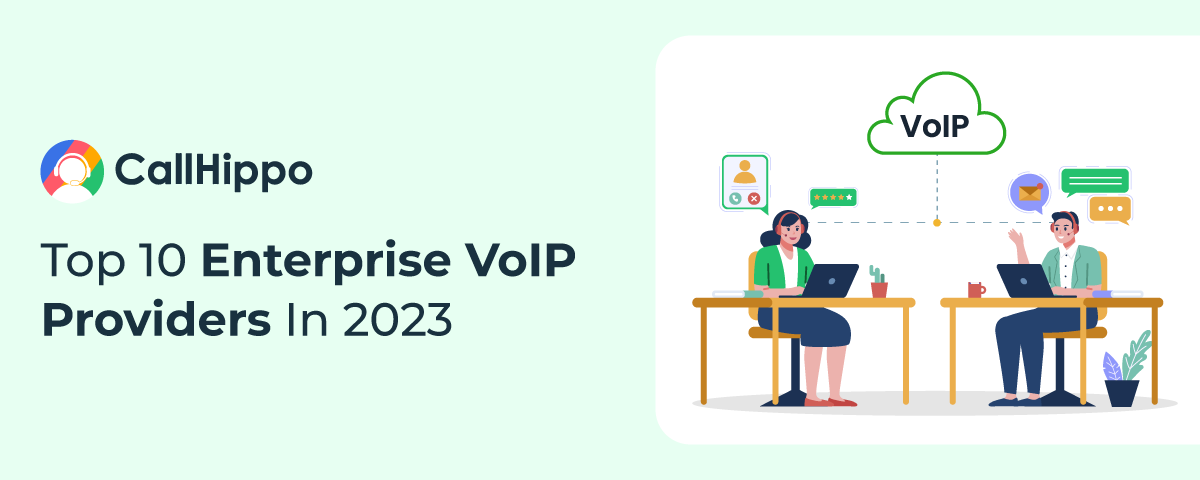Do You Want to Make More Calls?
Set up CallHippo VoIP system in less than 3 minutes and start calling.
Senior Writer: Supriya Bajaj
As organizations of all sizes strive to keep up with their competition, modernizing the way they communicate is vital. VoIP (Voice over Internet Protocol) phone systems offer a smart option for those who value efficiency, scalability, and cost-effectiveness. Enterprise VoIP solutions are in high demand, with various features capable of transforming remote communications.
With the multitude of options, selecting the right Enterprise VoIP provider for your company can be challenging. To help make the right decision, we have created a comprehensive guide assessing the essential features to look for when selecting a VoIP enterprise solution and providing an overview of the top 11 Enterprise VoIP providers for 2023. Use this information to buy a plan that suits the needs of your business.

"When buying an enterprise VoIP system, consider scalability, reliability, integration, security, support, and cost. Ensure the system can grow with your business, has high uptime and security features, integrates with your existing applications, and has excellent customer support. Additionally, consider the total cost of ownership, including hardware, software, implementation, and ongoing maintenance costs."
What Is Enterprise VoIP?
Enterprise VoIP is similar to residential VoIP but with improved reliability, quality, and capabilities. It utilizes the internet instead of traditional phone lines to make calls and provides high-quality audio and video, conference call capabilities, and additional features such as call routing and recording. Moreover, VoIP enterprise solutions are simpler to set up, more secure, and more easily scalable than residential VoIP services.
Benefits Of Switching To An Enterprise VoIP
Besides offering more features than a traditional phone line, switching to an Enterprise VoIP system can also offer a bundle of business-minded benefits. These include:
1. Cost Savings
Enterprise VoIP can be more cost-effective as compared to traditional phone systems. Not only are the plans often less expensive than landline plans, but international calls can also offer great savings as VoIP is based on global IP addresses.
2. Scalability
An Enterprise VoIP system provides scalability to accommodate businesses of any size – whether they are growing, shrinking, or just need a few adjustments here and there. It enables you to add, remove, and modify lines with ease, ensuring that your business is always up-to-date with the latest technology.
3. Flexibility
Most Enterprise VoIP providers offer plans that are easily managed online, making it simpler for those on the go to stay connected without being confined to a physical office space.
4. Improved Quality of Service
Enterprise VoIP systems are designed to prioritize voice data above other types of data, thereby assuring improved call quality and lowering the possibility of disruption, especially in the case of international calls.
5. Remote Working Capabilities
Enterprise VoIP systems allow employees to use the same business phone number no matter where they’re working, providing versatile office access and collaboration.
6 Enterprise VoIP Trends You Should Know About
VoIP systems have already gained immense popularity with applications like Skype, Google Hangout, Google Duo, and WeChat. Specific trends within the VoIP market have been intensifying over the past few years, including:
- the consolidation of online communication technologies
- the effect of the Internet of Things (IoT)
- an increase in mobility of virtual phone systems
- growing security concerns
- the slow death of traditional telephones.
With Google’s WebRTC, organizations and designers can improve their platforms with VoIP without applications and codes. Heading ahead to mid-2022, we have compiled a list of the 6 most essential VoIP trends to keep an eye on before the year ends.
Increasing Popularity of UCaaS
Communication technologies are consolidating to become single unified communications as a service (UCaaS) since such platforms give many more services than just voice calling capabilities. These mechanisms offer instant messaging and team collaboration features like screen sharing, video/web conferencing, faxing facilities, and many more.
It centralizes all online communications within one cloud-based platform for companies to manage their business effectively from anywhere with a secured internet connection. Hence, you must have a UCaaS platform to manage business data seamlessly while it is hot in the market.
AI Technology for VoIP
Auto-attendants are becoming a massive boom since they can speed up communications and optimize call handling, which is one of the main reasons you must have this in your enterprise VoIP solution. AI will be the next smartest and most sensitive digital voice assistant that will conduct real-time sentiment analysis to inform agents about the customer’s behavior on call.
Improving intelligent call routing, which is also skills-based, is another way AI can boost VoIP-based business phone systems. AI has other potential uses for voice software, too, such as applying Natural Language Processing (NLP) technology to interpret voice or video calls in real-time.
5G for Mobile
5G has already been introduced for mobile phones which means, service providers will soon or have already started searching for ways to emerge the same in enterprise VoIP too. Currently, two of the most critical areas of concern for VoIP are call latency and quality of service, which are leading to frequent dropped calls. With 5G in virtual phone systems, it will lower latency, deliver increased throughput, get 100% network availability, and offer more bandwidth for sensor devices.
If 5G is integrated into business phone systems, then organizations will be able to connect customers in 1 millisecond as compared to ten milliseconds that 4G does. So, you can only imagine how productivity will increase across organizations by the end of 2022.
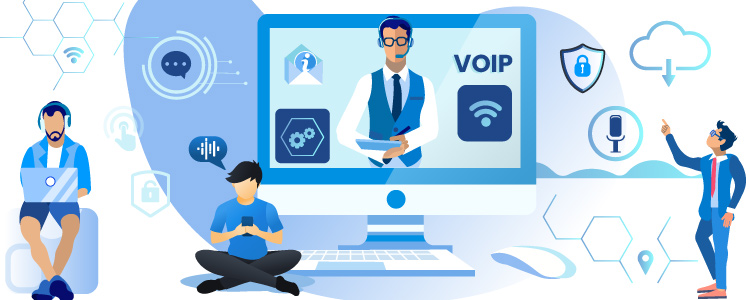
This significant increase in speed will bring drastic changes in VoIP calls –
- The quality of calls will be better; issues like jitters, packet loss, and disconnections will decrease significantly
- One can expect a higher number of mobile VoIP applications and even better ones to enter the marketplace
- As 4k and 8k video has become possible, web conferencing and VOIP video will see improvements. Sending video data will be faster, resulting in a quality viewing experience.
Looming Security Concerns
The virtual phone numbers give users an extra layer of privacy and security by providing them with separate business phone numbers, so they don’t have to give out personal phone numbers. However, like all other internet-enabled devices, VoIP systems are susceptible to cyber-attacks.
Thus, organizations will have to consider internet-based security plans while purchasing a VoIP solution for their business operations. Talking with various vendors will help know what measures and tactics to use to guard against phishing, system misconfiguration, network intrusion, stolen records/information, etc.
Organizations that are specially catering to highly regulated industries such as defense, healthcare, finance, pharmaceuticals must take proper measures in cyber-security while getting business VoIP systems.
Integrated In-app Communications
Modern multi-tasking employees strive to complete all the tasks assigned using only a handful of tools. Hence, alliance with cloud-based programs using Application Programming Interfaces (APIs) is on the rise due to the demand for multi-tasking apps. These APIs are used to connect customer relationship management (CRM) tools, enterprise resource planning (ERP), as well as a support center and help-desk software.
Such integration of VoIP systems with apps and services will help small and medium-sized businesses tremendously to achieve their goals faster and efficiently. Employees, too, can benefit from these integrated in-app communications to meet their productivity goals.
Increasing Mobility
With the rise of mobile phones, VoIP providers now offer mobile applications based on virtual phone numbers for both iOS and Android phones, along with desktop applications. This enables users to connect to their companies’ VoIP networks while traveling, or during situations when they can be present physically to manage impromptu tasks. However, organizations that issue mobile devices to their customers haven’t had the tools yet needed to track conversations with customers on mobile. For example, features like CRM integrations, call recording, and caller ID haven’t been available. Many vendors are now planning to address this by the end of 2022 and make it possible for companies to gain more insight into how their workforce is interacting with potential customers and clients via mobile devices.
11 Best Enterprise VoIP Solutions
Now that you have a better understanding of Enterprise VoIP and how to choose a provider, let’s take a look at the top 11 enterprises VoIP providers in 2023.
| Brand Name | Rating | Key Features | Pricing |
|---|---|---|---|
| CallHippo | Call forwarding Call recording Voicemail Text messaging | Basic: $0 Bronze: $16 /month Silver: $24 /month Platinum: $40 /month | |
| Vonage | AI virtual assistant High-definition call quality Unlimited calling and text messaging on all plans Free video conferencing | Mobile: $14.99 Premium: $24.99 Advanced: $34.99 | |
| RingCentral | Business phone or toll-free numbers Unlimited calling within the US and Canada Business SMS IVR | Core: $20 Advanced: $25 Ultra: $35 | |
| 8×8 | Unlimited calling in the US and Canada Auto attendant Music on hold Voicemail Team messaging Hot desking Call queues | X2: $24 X4: $44 | |
| Dialpad | Text, audio, and video calling Speech analytics Caller ID Mobile app and desktop app IVR systems | Standard: $15 Pro: $25 Enterprise: Contact sales |
1. CallHippo
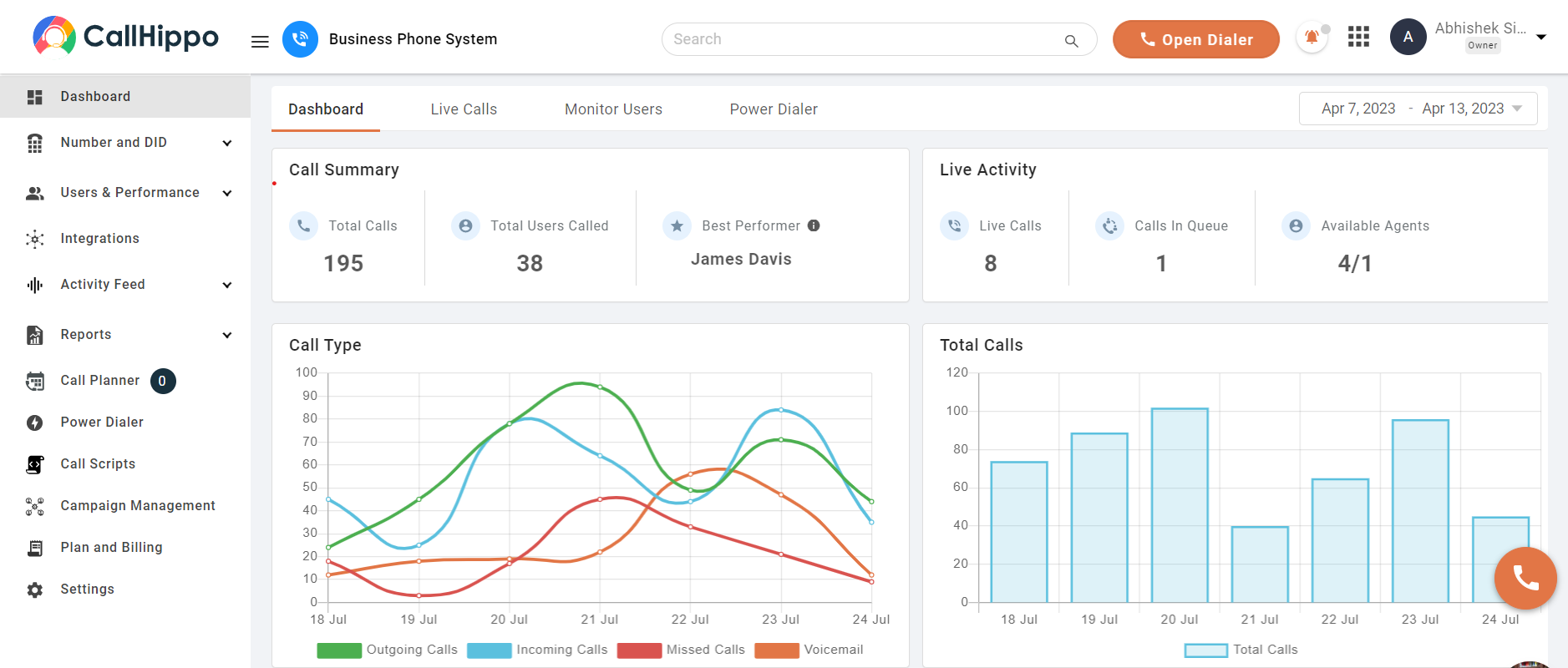
CallHippo is a cloud-based VoIP for enterprise that comes with an array of features, such as a business Voicemail, automated call routing, an online calling portal, and more.
Key Features:
- No contract
- Reasonable pricing
- Free international calls
- Features to help you develop business metrics
- Mobile app
CallHippo Pros and Cons

- Excellent call forwarding feature
- Great customer support
- Easy integration
- User-friendly interface





- Voicemail technology can be upgraded
- Reporting is hard to download


Pricing:
- Bronze – $16.00 (For Startups)
- Silver – $24.00 (Ideal For Small Sales Team)
- Platinum – $40.00 (Preferred For SMB Sales, Support & Marketing Teams)
2. Vonage
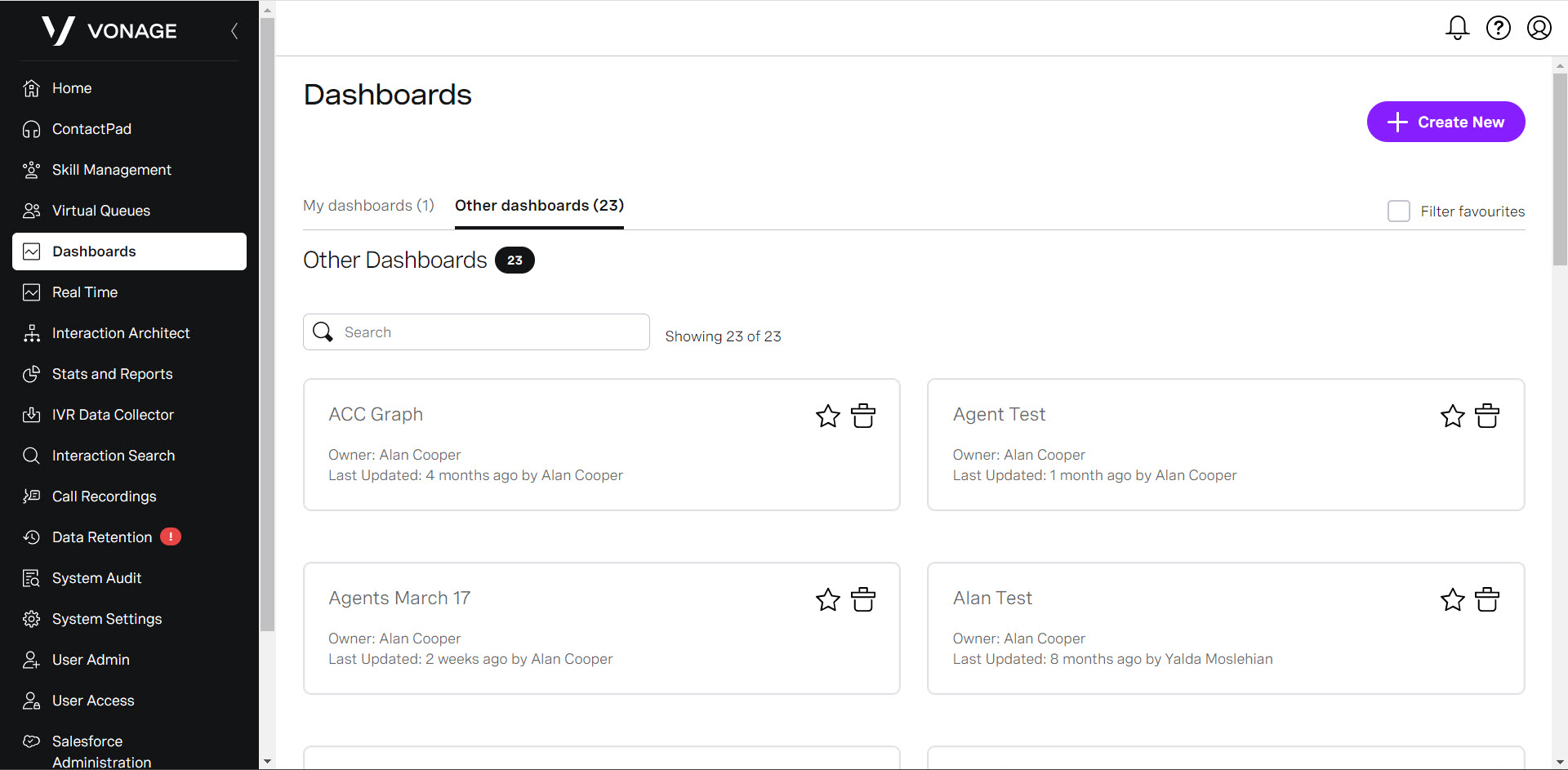
Vonage is a cloud-based Enterprise VoIP provider with features and tools, such as unified communications, video conferencing, and mobility features.
Key features:
- Robust call routing options
- Cloud-based voice mail
- Auto attendant, and more
- Availability on all major mobile platforms
Vonage Pros and Cons

- Fairly intuitive configuration
- Easy to add new licenses
- Affordable pricing




- Poor customer support
- Phone inconsistency


Pricing:
- Mobile – $19.99 per month/per line (plus taxes & fees)
- Premium – $29.99 per month/per line (plus taxes & fees)
- Advanced – $39.99 per month/per line (plus taxes & fees)
3. RingCentral
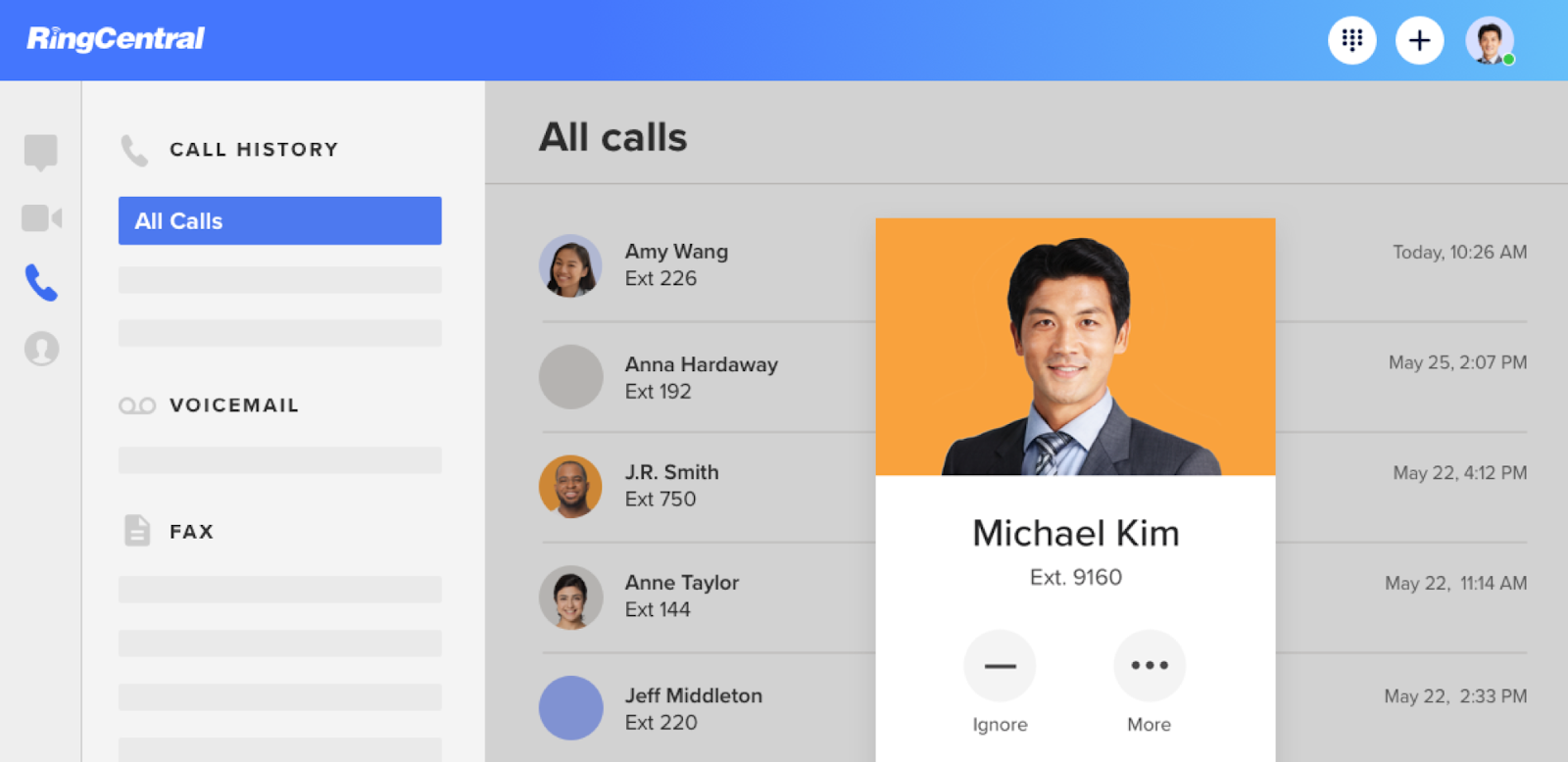
RingCentral is a cloud-based VoIP for enterprises with various features to help you stay connected with your team.
Key features:
- Automated attendants
- Conference bridge
- Virtual offices
- Unified communications
Ringcentral Pros and Cons

- Customization options
- Simple to administer
- Enhanced call management capabilities
- User-friendly interface
- Call analytics feature






- Essentials plan limited to Max 20 users & 100 mins
- No video, app integrations
- No 24/7 support at entry



Pricing:
- Essentials – $19.99 /user/month **
- Standard – $27.99 /user/month **
- Premium – $34.99 /user/month **
You May Also Read : How To Setup VoIP? Requirements for VoIP Implementation
4. 8X8
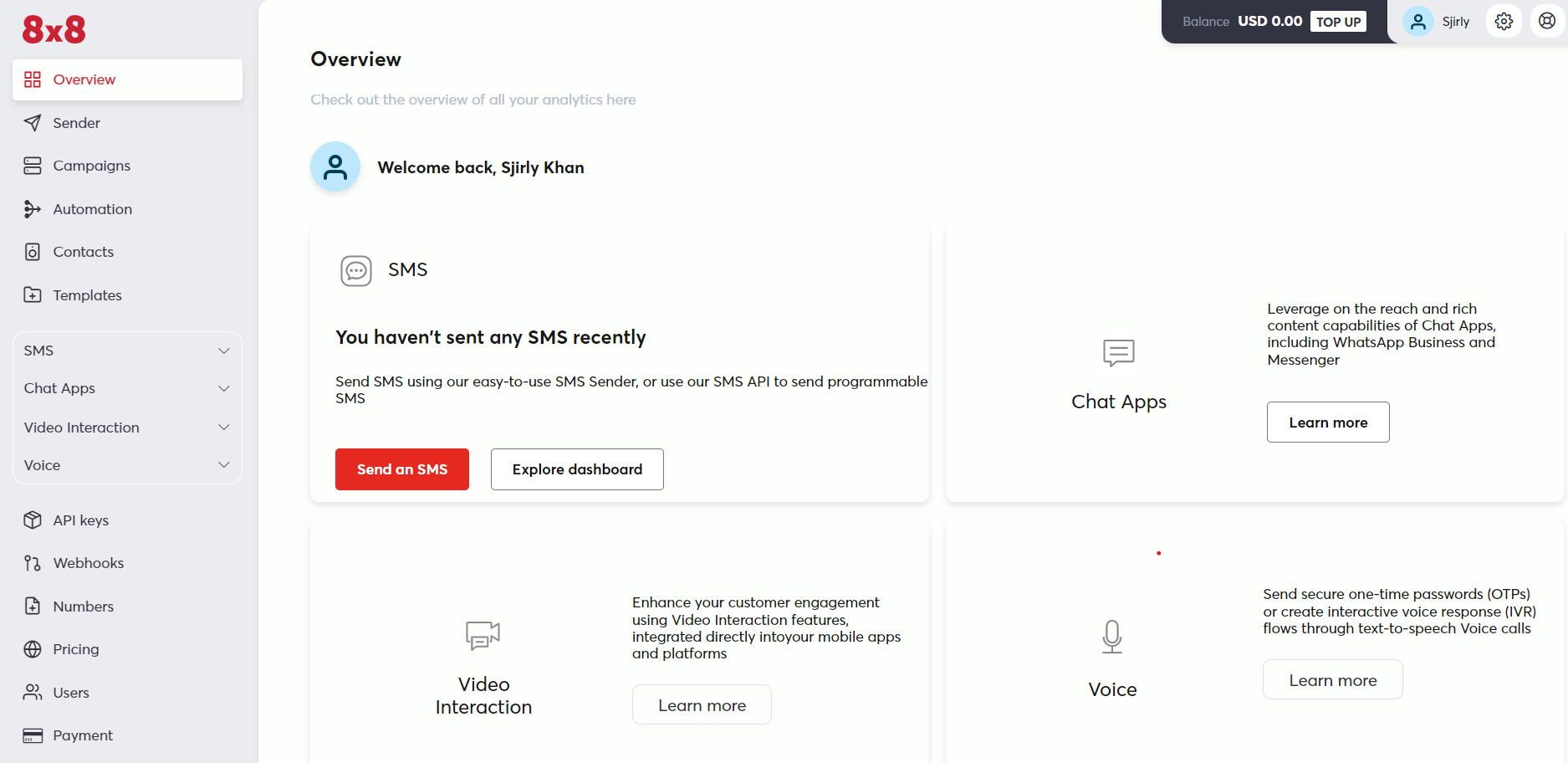
8X8 is another cloud-based VoIP provider that comes with features such as conferencing, video calling, and SMS.
Key features:
- Lowest international calling rates
- Unlimited Voicemail storage
- Integrated contact center
- API-powered integrations
8X8 Pros and Cons

- Easy to use
- Great customer support
- Multiple platforms
- Low cost per user
- Decent price






- Poor voice quality
- Installation uses
- Complicated reporting



Pricing:
- Express – $15 per user/month
- X2 – $24 per user/month, annually
- X4 – $44 per user/month, annually
5. Dialpad
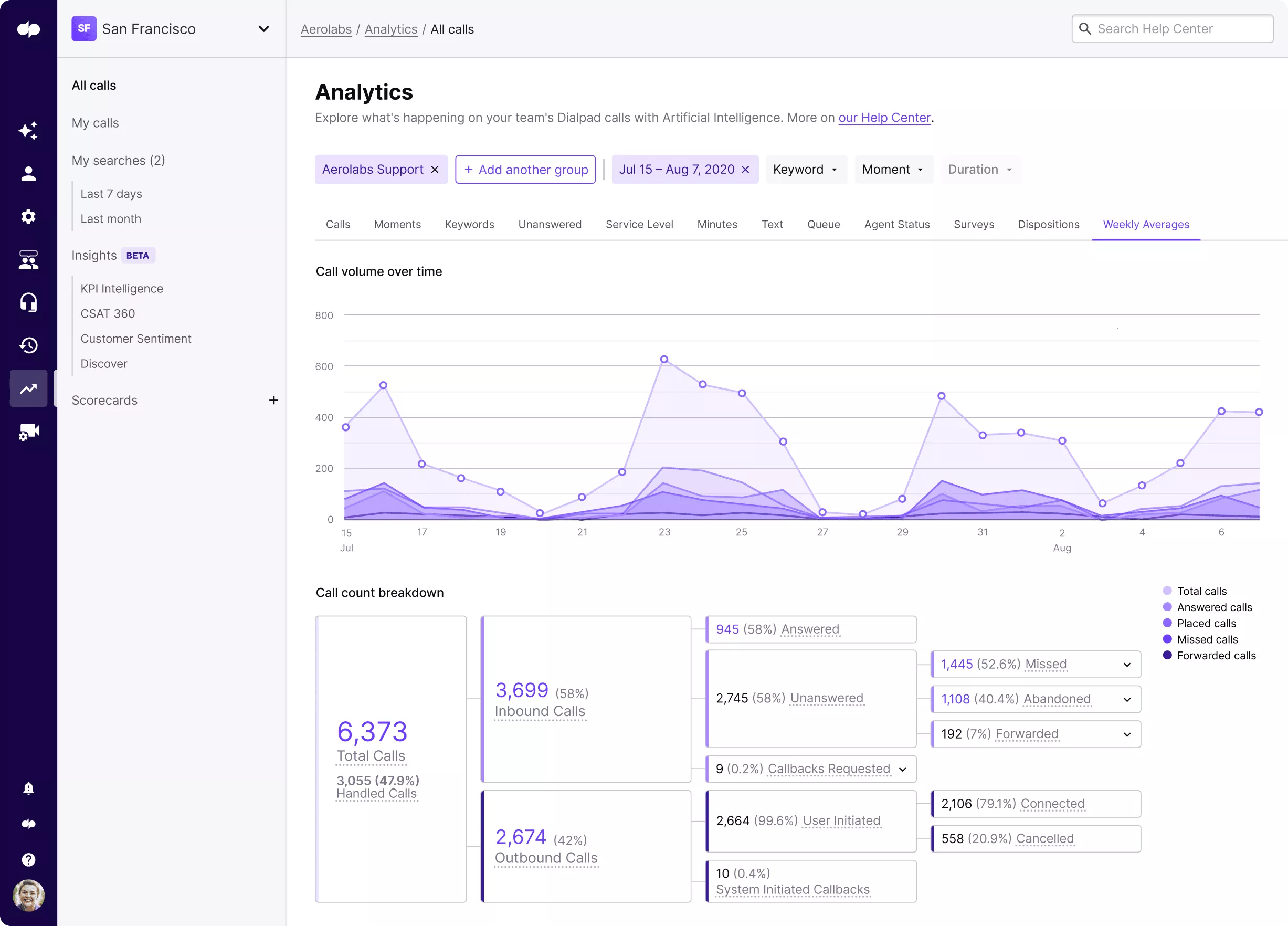
Dialpad is an AI-powered Enterprise VoIP provider that comes with features such as a virtual assistant, auto-attendant, and analytics.
Key features:
- App Integration
- Unlimited Calls
- International Calls
- Call Routing
- Desk Phone Integration
- Voicemail
Dialpad Pros and Cons

- All plans come equipped with Artificial Intelligence-based voice intelligence
- Easy and effortless integration with Google Workspace and Microsoft Outlook
- Maximum reliability through a 100% uptime service-level agreement
- Adherence to HIPAA, PCI, GDPR, and CSA regulations





- Not available worldwide
- No 24/7 support on the Standard plan
- Video conferencing is limited to ten participants with lowest level plan



Pricing:
- Standard – $15/mo/user (billed annually)
- Pro – $25/mo/user (billed annually)
- Enterprise – Not listed, contact sales
You May Also Read : VoIP Advantages and Disadvantages You Need To Know
6. DialerHQ
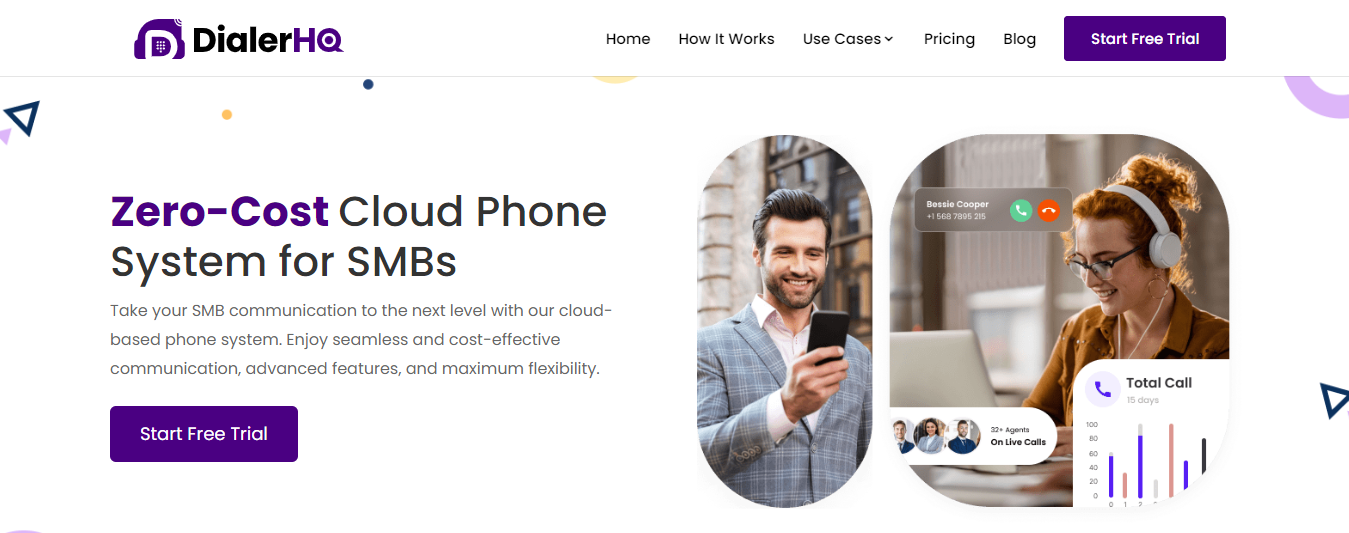
DialerHQ is a leading enterprise VoIP service offering innovative communication solutions. With an emphasis on dependability, scalability, and cutting-edge features, DialerHQ seeks to provide organizations with effective communication tools. Businesses make and receive high-quality voice and video calls using DialerHQ instead of expensive infrastructure and traditional phone lines.
Key Features:
- Power dialing
- Call recording
- Auto attendant
- Voicemail transcription
- Call analytics
- Mobile integration
- Call forwarding
DialerHQ Pros and Cons

- Compliance and legal requirements
- Efficient performance evaluation
- Excellent flexibility and scalability
- Enhanced productivity of users





- Excessive technical dependencies
- Learning curve for beginners
- Limited control of system configuration



Pricing:
DialerHQ offers four pricing options for call center solutions. It includes:
- Basic- $0
- Bronze- $7.99/user/month
- Silver- $11.99/user/month
- Platinum-custom pricing
7. 3CX
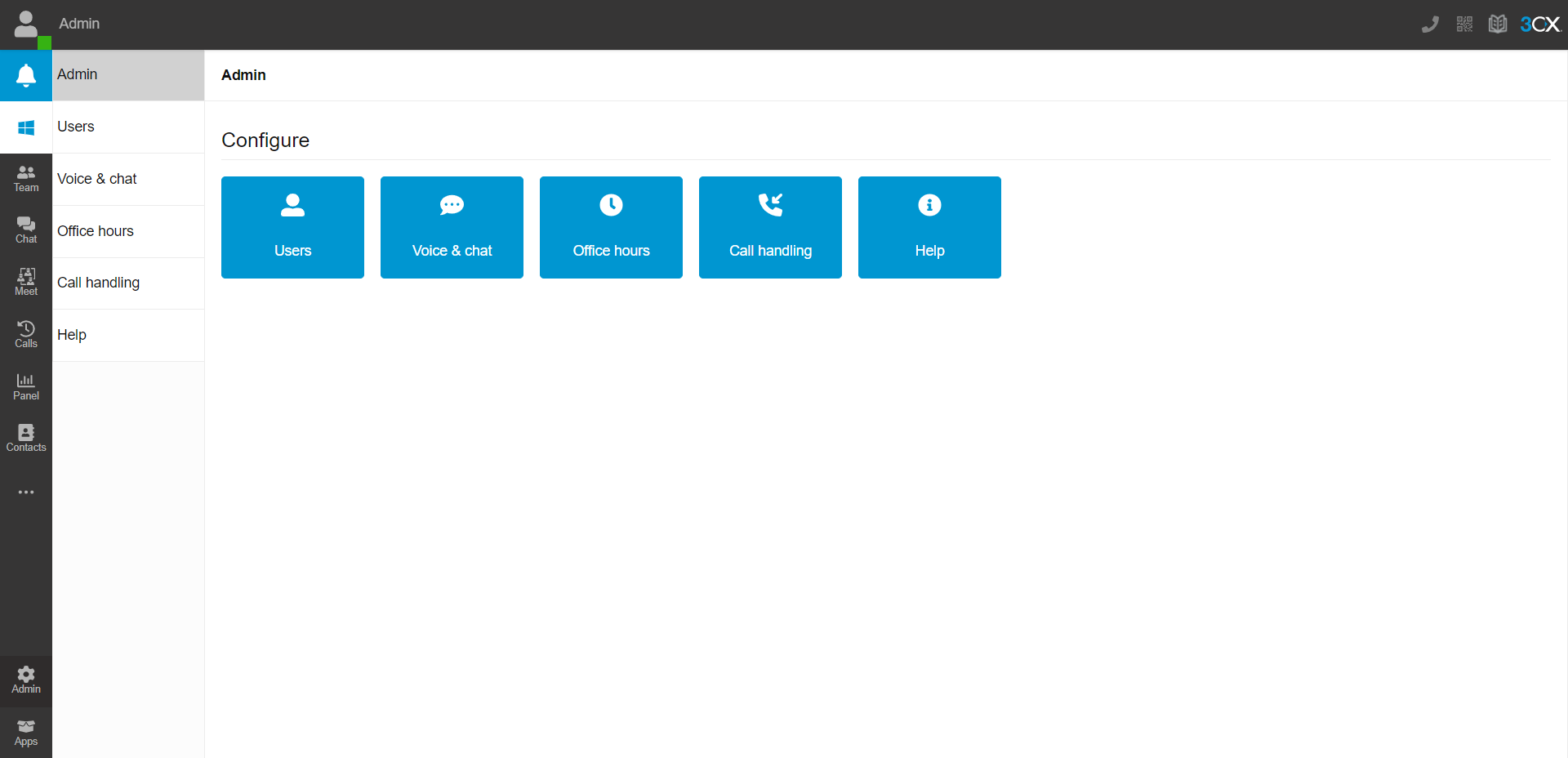
3cx is a robust VoIP for enterprise that includes features such as conference bridge, logging of calls, and more.
Key features:
- Call recording
- Voicemail
- Automated attendants
- CRM integrations
3CX Pros and Cons

- Amazing call quality
- Great integration capabilities
- Easy to set-up
- Management options





- Poor Customer service
- Integrations and API
- Scripting/CLI tools



Pricing:
- Startup Free – $0 forever (for 10 users)
- Startup Pro – $175 p.a. (for 10 users)
- Dedicated Pro – $295 p.a. (4 sim calls)
- Dedicated Enterprise – $330 p.a. (4 sim calls)
8. Aircall
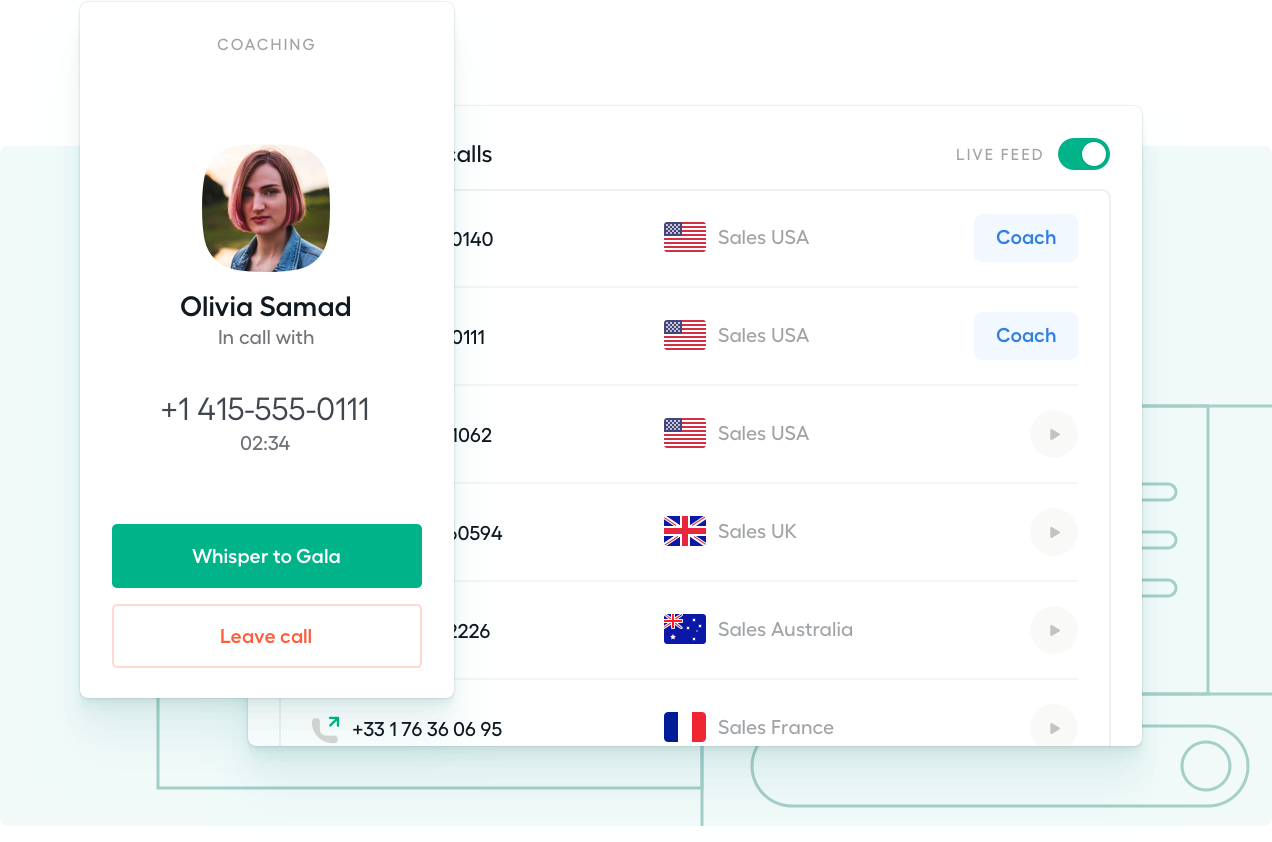
Aircall is a cloud-based VoIP system with features such as call logs, analytics, and IVR.
Key features:
- Team messaging
- Rich contact management
- Call queuing
- Mobile applications
Aircall Pros and Cons

- Ease of use
- Straightforward functionality
- Over 60 integrations available




- Very expensive
- Video calls not available


Pricing:
- Essentials – $40/user/month
- Professional – $70/user/month
- Custom plan – Contact Aircall
9. GoTo Connect
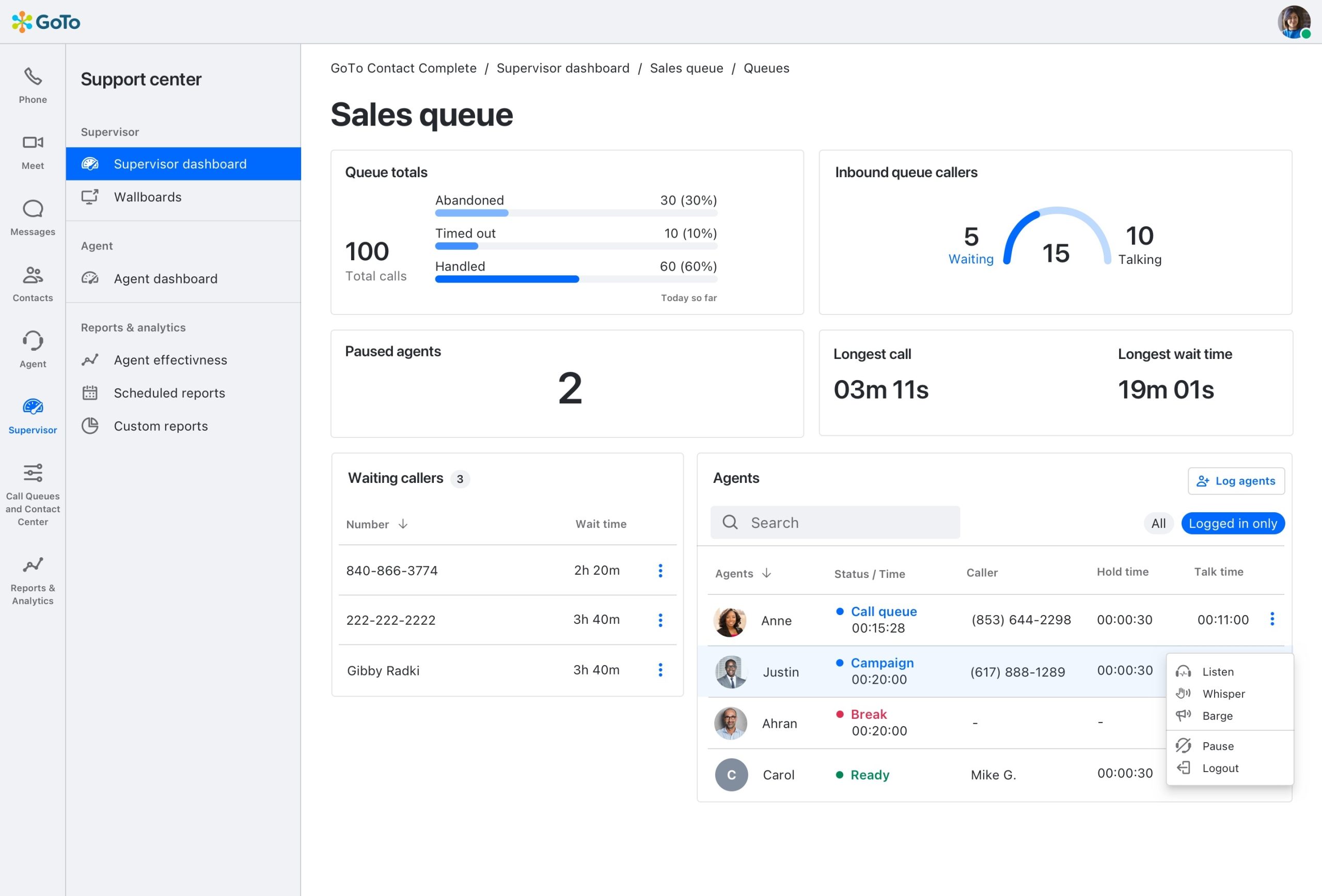
GoTo Connect is a cloud-based VoIP for enterprise with features such as Voicemail transcription, unified communications, and video conferencing.
Key features:
- Conference bridge
- Automated attendant
- Robust mobility options
- Conference room integration
GoTO Connect Pros and Cons

- Premium plan offers over 100 different capabilities
- Basic plan includes both team chat and video conferencing capabilities
- All plans have integration options available
- Pay annually to receive discounts
- Works seamlessly with more than 180 IP desk phones






- Basic plan accommodates only one location
- 25 webcams allowed during video meetings


Pricing:
- Basic: $32/mo for 1 user, $27/mo for 2-10 users ($24/mo with one-year contract).
- Standard: $32/mo for 2-10 users ($29/mo with one-year contract), $29/mo for 11-20 users ($26/mo with one-year contract), and $26/mo for 21-50 users.
- Premium: $43/mo for 2-10 users, $40/mo for 11-20 users, and $37/mo for 21-50 users. Over 100 users: $33/mo.
10. Genesys
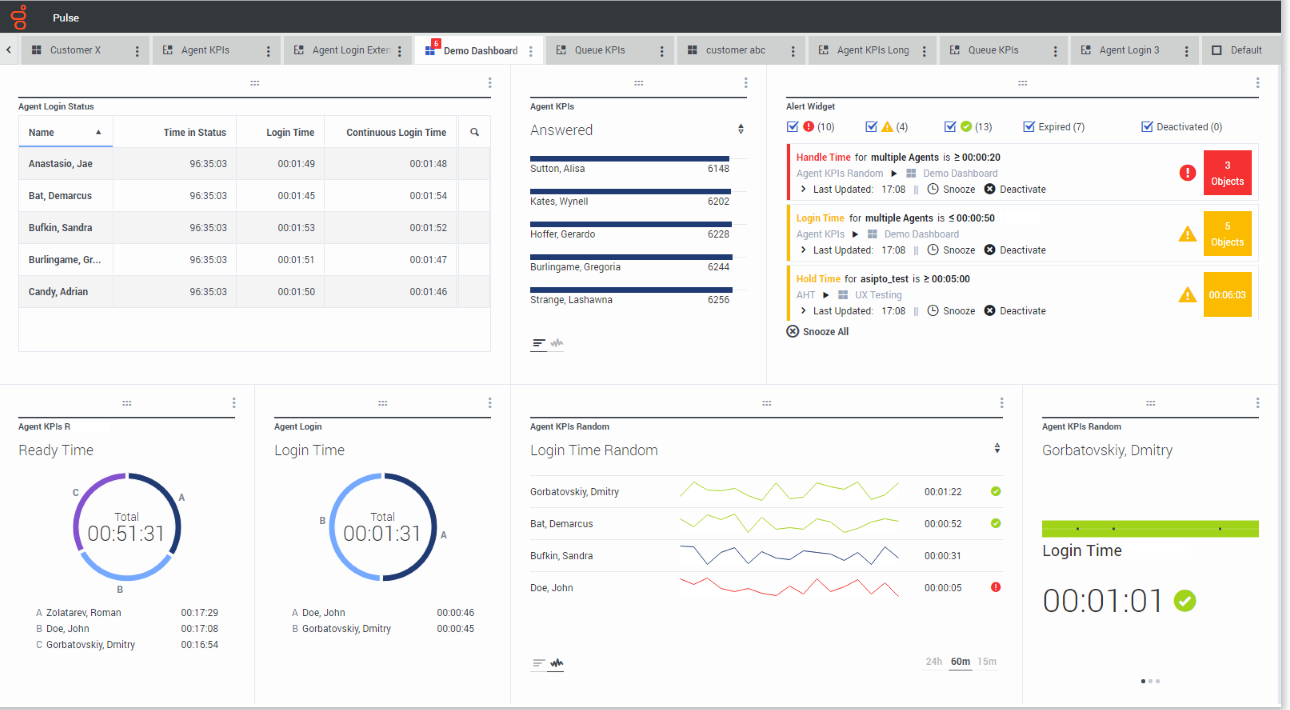
Genesys is AI-powered enterprise VoIP phone system with features such as analytics, call routing, and contact center solution.
Key features:
- IVR auto-attendant
- Unified communications
- Automatic call distribution
- Mobility options
Genesys Pros and Cons

- Multiple options and solutions
- Great reporting structures
- Moment-by-moment monitoring
- Good integration feature for CRM and data management
- Ease of setup and deployments






- High price
- Poor customer support
- Softphone use can have issues
- Features lack slightlyt




Pricing:
- Genesys Cloud CX 1 (Voice) – $75 Monthly USD
- Genesys Cloud CX 2 (Digital) – $90 Monthly USD
- Genesys Cloud CX 2 (Digital + Voice) – $110 Monthly USD
- Genesys Cloud CX 3 (Digital + WEM) – $130 Monthly USD
- Genesys Cloud CX 3 (Digital + WEM + Voice) – $150 Monthly USD
You May Also Read : What is a VoIP Phone System?
11. OpenPhone
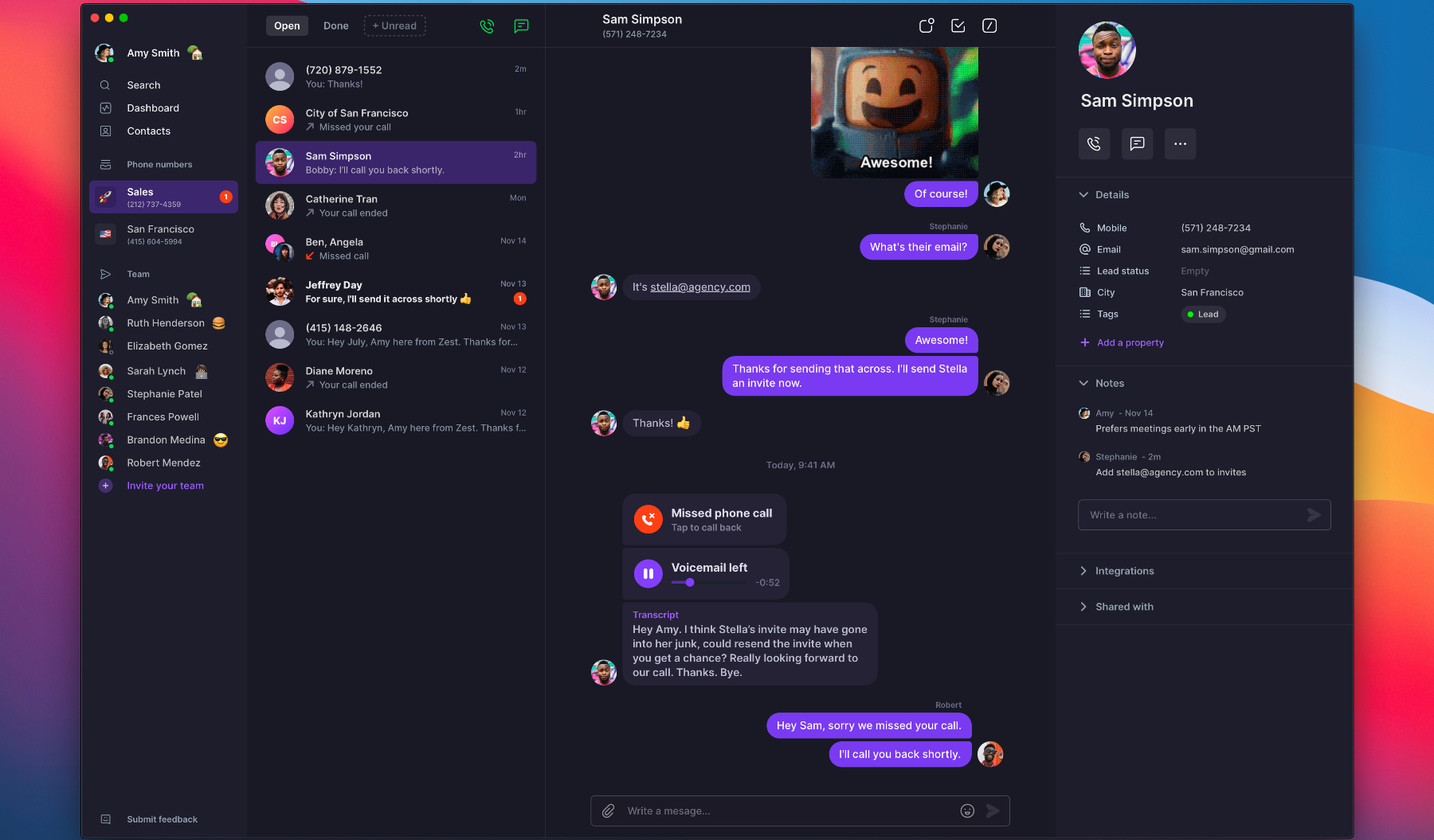
OpenPhone is a cloud-Based VoIP phone system with features such as Voicemail to text, video conferencing and team messaging.
Key features:
- Call Center Management
- Call Logging
- Call Recording
- Call Routing
- IVR/Voice Recognition
- Mobile Access
- Online Voice Transmission
OpenPhone Pros and Cons

- Simple, affordable, and well organized.
- Great customer service
- US phone number available
- Great selection of toll-free numbers
- User-friendly UI






- Bad sound quality
- Less native integrations
- Does not support 3-Way/Conference calling
- Issues receiving photo messages at times




Pricing:
- Standard: $13/user/month
- Premium: $25/user/month
- Enterprise: Contact OpenPhone Technologies directly for pricing details
Features Of An Enterprise VoIP Solution
Modern enterprise VoIP platforms have a range of features. When looking for an Enterprise VoIP solution, there are a few key features you should keep an eye out for. These include:
1. Automated Attendant
An automated attendant is like a virtual receptionist, routing incoming calls to the right department or person and answering basic questions. It streamlines the process of handling these calls, ensuring quick and efficient service for callers.
2. Unified Communications
Unified Communications (UC) offers a suite of cutting-edge tools to help you stay connected and productive no matter where you are. With UC, you can make VoIP calls on your mobile device, access corporate data, and have video conferences with your team – all from a single, convenient platform. UC streamlines your communications, so you can catch all of the beat regardless of where you are.
3. Video Conferencing
Video conferencing is an excellent way for remote teams to stay connected. With advanced VoIP enterprise solutions, team members can easily join audio and video conferences, making it easier to maintain vital interpersonal connections without being in the same physical space.
4. Call Routing
Call routing is another important feature in VoIP enterprise solutions that can customize forwarding options for different departments and numbers, ensuring that customers are connected to the correct person or service. With this personalized call routing system, you can assure your customers a smooth, efficient service every time.
5. Call Forwarding
Call forwarding provides the convenience of receiving your calls on an alternate phone if you are away from your desk. You can forward any incoming call to another internal or external phone number, making sure that you don’t miss important calls, no matter where you are. With this feature, you will ensure that you get all the important calls!
6. Call Transfer
Call transfer feature is convenient for any business scenario where several people work as part of a team or customers need to be routed to the correct service provider. Call transfer increases efficiency and decreases customer wait times by quickly connecting calls to the right person who can further assist with customer needs.
The user can also set up rules for call transfers that take into account the day and time of the call, such as transferring the call to voicemail outside of normal business hours.
7. Call Queuing
With call queuing for Enterprise VoIP solutions, you can customize the setup to allow for the most efficient customer experience. You can set a maximum wait time, choose to hold music or have custom messages played while customers wait, or even offer a call-back option if customers decide they no longer wish to wait.
Not only do customers have a positive and streamlined experience, but your company gains improved customer relations and increased productivity.
8. Voicemail to Email
Enterprise VoIP solutions with voicemail-to-email features are incredibly efficient and can help improve customer service. This feature automatically sends voicemails to a user’s email or mobile device, allowing businesses to access, organize, and store communication records more effectively. Not to mention, manual transcribing of recordings is no longer required.
Plus, with secure cloud storage, businesses can be assured their recordings are fully protected from data loss and always accessible for backup. This is truly an invaluable asset when it comes to achieving optimal communication efficiency.
9. Presence and Availability
With enterprise VoIP solutions, companies benefit from enhanced presence and availability features that allow users to see who is available to chat or call at any given moment. This elevates the level of collaboration and communication between work colleagues, enabling a more effective workflow. It also reduces response time to customer inquiries and boosts overall productivity.
10. Web-based Management Portal
From automated provisioning for easier device setup to advanced user interface analytics for a better understanding of hosts, the web-based management portal provides a comprehensive picture of any organization’s telecommunication platform. It gives admin teams greater control over their VoIP system while automating tedious maintenance tasks.
With the click of a single button, users can access and utilize an array of features that offers granular control, from managing user permissions to making device changes – all from within the web-based management portal.
How to Choose An Enterprise VoIP Provider?
When it comes to choosing an Enterprise VoIP provider, it’s important to pick one that meets your needs and can scale with your business. Here are a few important factors to keep in mind:
1. Features
It is a good idea to take into consideration what features are offered with each potential enterprise VoIP provider’s package. Make sure the features being offered match what your communication needs require; from digital phone platforms which offer unified communications through audio & video conferencing as well as team collaboration tools, there are a variety of features that may be beneficial depending on how they will be used in your organization.
2. User Reviews
Before deciding on an enterprise VoIP provider it is important to read up on user reviews regarding their products and services. Check out popular tech blogs or forums for hands-on customer experience reports so you can make the most informed decision possible.
3. Support
The quality of customer service and technical support provided by an enterprise VoIP provider should be taken into consideration when choosing one. It’s important to research the company’s hours of assistance, available customer service options (phone, chat, email etc.), and response times to make sure that you can get help if needed.
4. Security/Privacy Features
When looking for an Enterprise VoIP provider, security and privacy should be a top priority. Ask questions about how data is encrypted and stored, what measures are taken to protect customer information and conversations and whether they offer two-factor authentication — all of which will help keep your information secure.
5. Scalability
Businesses need to consider scalability when researching VoIP providers. Make sure that the VoIP provider you choose can accommodate future growth and expansion, such as additional features or users, without an extra cost or disruption to service.
6. Cost & Service Agreements
Compare different VOIP providers to see who has the best pricing options for your needs or any perks that may come with bundle packages – it could help you save money in the long run. Evaluate different service agreements – read contract details carefully so that you know what fees are included, what terms apply, and termination policies prior to making any commitments.
You May Also Read : Trends to Know About Enterprise VoIP(Voice Over Internet Protocol) System
Wrapping Up
As technology and the market continue to evolve, it is essential for business owners of all sizes to choose the right VoIP provider for their needs. With the latest advancements in VoIP technology, enterprises can now gain access to reliable, innovative, and feature-rich products. Utilizing these services will help them take their communications capabilities to the next level while saving valuable time and money.
To help you make an informed decision, we’ve mentioned above the top 11 enterprise VoIP providers for 2023. Research each enterprise voip service provider carefully and select one that best meets your business requirements; this could be your key to unlocking enhanced communications at a competitive rate.
FAQs
Q1: What’s the difference between Enterprise VoIP and a regular landline?
Enterprise VoIP is a digital telephone system that allows businesses to make calls over the internet. This system offers numerous features beyond those of traditional landline telephones—features like automated attendants, Unified Communications.
Q2: What is an enterprise phone system?
An enterprise phone system is a VoIP solution specifically designed for businesses. It provides various features, including call routing, video conferencing, unified communications, and more – making it the ideal solution for all kinds of businesses.
Q3: What is the difference between enterprise VoIP and small business VoIP?
Enterprise VoIP solutions are far more comprehensive than those designed for small businesses. With features such as video conferencing, automated attendants, and CRM integrations, enterprise VoIP can provide many more options than smaller business VoIP solutions.
Q4: What are the limitations of Enterprise VoIP?
Like any phone system, Enterprise VoIP has its limitations. For instance, it relies on an internet connection to function; this means that if there is an outage, your calls will likely not be successful. Further, depending on the provider you select, not all features may be available.

Subscribe to our newsletter & never miss our latest news and promotions.
 +21K people have already subscribed
+21K people have already subscribed